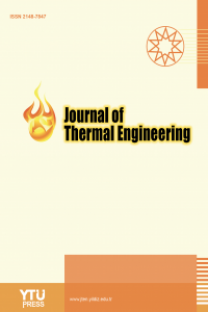CONSTRAINED GA PI SLIDING MODE CONTROL OF INDOOR CLIMATE COUPLED MIMO GREENHOUSE MODEL
High accuracy trajectory tracking with constrained inputs is challenging topic in greenhouse indoor environment control. This is due to nonlinearities and inputs/outputs coupling present in physical model of greenhouse. The objective of this study is about the problem of identification and control of a Multi-Input Multi-Output (MIMO) greenhouse process. Proportional Integral (PI) and sliding mode controllers (SMC) are used in conjunction so that estimated outputs tracks desired trajectories with good performance as near as possible in spite of coupled dynamics and outside disturbances climate. To reflect the practical aspect, the constraints of the process and control elements were taken into account .The results demonstrate the feasibility of PISMC control method. Simulation has been done in the environment of Matlab and Simulink; it shows that combined controllers are capable to manage successfully the microclimate of greenhouse.
Keywords:
PI, Sliding Mode Control, Greenhouse MIMO, Microclimate Model, Constrained Inputs, Coupled Dynamics,
___
- [1] Revathi S, Sivakumaran N. Fuzzy Based Temperature Control of Greenhouse. IFAC PapersOnLine 2016; Vol 49, Issue 1, 549-554. https://doi.org/10.1016/j.ifacol.2016.03.112.
- [2] Emelyanov S. V. Variable structure control systems. Nauka, Moscow; 1967.
- [3] Blasco X, Martínez M, Herrero J.M, Ramos C, Sanchis J. Model-based predictive control of greenhouse climate for reducing energy and water consumption. Comput Electron Agr 2007; 55:49-70. https://doi.org/10.1016/j.compag.2006.12.001.
- [4] Draoui B, Bounaama F, Boulard T, Bibi-triki N. In-situ Modelization of a Greenhouse Climate Including Sensible Heat, Water Vapor and CO2 Balances. EPJ Web of conferences 2013; 45.01023. https://doi.org/10.1051/epjconf/20134501023.
- [5] Manonmani A, Thyagarajan T, Elango M, Sutha S. Modelling and control of greenhouse system using neural networks. Transactions of the Institute of Measurement and Control 2016; Vol 40, Issue 3, 918-929 https://doi.org/10.1177/0142331216670235.
- [6] Herrero J.M, Blasco X, Martínez M, Ramos C, Sanchis J. Non-linear robust identification of a greenhouse model using multi-objective evolutionary algorithms. Biosyst Eng 2007; Vol 98, Issue 3, 335-346. https://doi.org/10.1016/j.biosystemseng.2007.06.004.
- [7] Patil S.L, Tantau H.J, Salokhe V.M. Modelling of tropical greenhouse temperature by auto regressive and neural network models. Biosyst Eng 2008; 99:423-431. https://doi.org/10.1016/j.biosystemseng.2007.11.009.
- [8] Cheng M, Yuan H, Zhang M, Cheng M. The Research of Control Method of Greenhouse Based on Global Variable Prediction Model. Chem. Eng. Trans. 2016; Vol. 51,277-282. DOI: 10.3303/CET1651047.
- [9] Trabelsi A, Lafont F, Kamoun M, Enea G. Fuzzy identification of a greenhouse. Appl. Soft Comput. 2007; Vol 7, Issue 3, 1092-1101. https://doi.org/10.1016/j.asoc.2006.06.009.
- [10] Draoui B. Caractérisation et analyse du comportement thermo-hydrique d’une serre horticole. Thèse de Doctorat de l’université de Nice-Sophia Antipolis, France;1994.
- [11] Boulard T, Draoui B, Neirac F. Calibration and validation of a greenhouse climate control model. Acta Hortic 1996; (ISHS), 406, 49-62. https://doi.org/10.17660/ActaHortic.1996.406.4.
- [12] Boulard T, Baille A. A simple greenhouse climate control model incorporating effects on ventilation and evaporative cooling. Agr Forest Meteorol 1993; 65, pp. 145-157. https://doi.org/10.1016/0168-1923 (93)90001-X.
- [13] Rodriguez F. Modeling and hierarchical control of greenhouse crop production (in Spanish). PhD thesis. University of Almeria, Spain; 2002.
- [14] Boulard T, Wang S. Greenhouse crop transpiration simulation from external climate conditions. Agric For Meteorol. 2000; Vol 100, Issue 1, 25-34. https://doi.org/10.1016/0168-1923(93)90001-X.
- [15] Ghoumari M.E, Tantau H, Serrano J. Non-linear constrained mpc: real-time implementation of greenhouse air temperature control. Comput Electron Agr 2005; 49, 345-356. https://doi.org/10.1016/j.compag.2005.08.005.
- [16] Moughli H. Elaboration d’un modèle réduit d’ordre deux du bilan d’énergie d’une serre, Identification avec Optimisation des paramètres. Mémoire de magister en physique énergétique;2007.
- [17] Bounaama F, Draoui B. Greenhouse environmental control using optimized MIMO PID technique. Sens Transduc 2011; 133:44-52.
- [18] HollandJ.H. Adaptation in Natural and Artificial System. Ann Arbor, the University of Michigan Press; 1975.
- [19] Salami M, Cain G. An Adaptive PID Controller Based on Genetic Algorithm Processor. Genetic Algorithms in Engineering Systems: Innovations and Applications 1995; 12-14 September, Conference Publication No. 414, IEE. https://doi.org/10.1049/cp:19951030.
- [20] Yusuf L.A, Magaji N. GA-PID Controller for Position Control of Inverted Pendulum. Adaptive Science & Technology (ICAST), IEEE 6th International Conference on 29-31 Oct. 2014. https://doi.org/10.1109/ICASTECH.2014.7068099.
- [21] Lammari K, Bouaama F, Draoui B, Mrah B, HaidasM. GA Optimization of the Coupled Climate model of an order two of a Greenhouse. Energy Procedia 2012; 18, 416-425. https://doi.org/10.1016/j.egypro.2012.05.053.
- [22] Dai C, Yao M, Xie Z, Chen C, Liu J. Parameter optimization for growth model of greenhouse crop using genetic algorithms. Appl Soft Comput 2009; 9:13-19. https://doi.org/10.1016/j.asoc.2008.02.002.
- [23] Fourati F, Chtourou M. A greenhouse control with feed-forward and recurrent neural networks . Simulat. Model. Pract. Theor. 2007; Vol 15, Issue 8, 1016-1028. https://doi.org/10.1016/j.simpat.2007.06.001.
- [24] Taylor C.J, Leigh P, Price L, Young P.C, Vranken E, Berckmans D. Proportional-integral-plus (PIP) control of ventilation rate in agricultural buildings. Control Eng Pract 2004; 12, 225-233. https://doi.org/10.1016/S0967-0661(03)00060-1.
- [25] Slotine J.J.E, Li W, Applied Nonlinear Control. Prentice-Hall; 1991.
- [26] Bandyopadhyay B, Deepak F,KimK.S. Sliding Mode Control Using Novel Sliding Surfaces. Springer; 2009.
- [27] Utkin V.I. Variable Structure Systems with Sliding Modes. IEEE Trans. Autom. Control. 1977; 22, 2, 212-222. http://dx.doi.org/10.1109/tac.1977.1101446.
- Başlangıç: 2015
- Yayıncı: YILDIZ TEKNİK ÜNİVERSİTESİ
Sayıdaki Diğer Makaleler
A. Sinan KARAKURT, Yasin ÜST, İbrahim KAYA
Mustafa Serdar GENÇ, İlyas KARASU, Halil Hakan AÇIKEL, Kemal KOCA
Suman BHATİA, Prabha SHARMA, Phool SİNGH, Pramod BHATİA
CONSTRAINED GA PI SL IDING MODE CONTROL O F INDOOR CLIMATE COU PLED MIMO GREENHOUSE MODEL
Khelifa LAMMARİ, Fatah BOUNAAMA, Ouradj BOUDJEMA, Belkacem DRAOUI
Mohammed ALMAKKİ, Hiranmoy MONDAL, Precious SİBANDA
MULTIFLUID DESCRIPTI ON OF RAREFIED GAS M IXTURE FLOWS
Iman ZAHMATKESH, Homayoun EMDAD, Mohammad M. ALİSHAHİ
Dileep KUMAR, Tayaba ZEHRA, Awais JUNEGO, Sajid Ali BHANBHRO, Muhammad BASİT
Kasni SUMERU, Mohamad Firdaus SUKRİ, Pratikto PRATİKTO, Apip BADARUDİN
